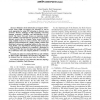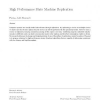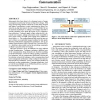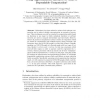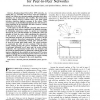1024 search results - page 189 / 205 » Fault Tolerance in Decentralized Systems |
IPPS
2010
IEEE
13 years 5 months ago
2010
IEEE
Abstract--Objectives of the dissertation are impacts of Peerto-Peer (P2P) traffic on Internet core networks as well as novel approaches for using P2P technology in Internet access ...
DSN
2011
IEEE
12 years 7 months ago
2011
IEEE
Computer systems are usually made fault tolerant through replication. By replicating a service on multiple servers we make sure that if some replicas fail, the service can still b...
DAC
2003
ACM
14 years 8 months ago
2003
ACM
Interconnects have been shown to be a dominant source of energy consumption in modern day System-on-Chip (SoC) designs. With a large (and growing) number of electronic systems bei...
RANDOM
1998
Springer
13 years 11 months ago
1998
Springer
Abstract. Redundancy has been utilized to achieve fault tolerant computation and to achieve reliable communication in networks of processors. These techniques can only be extended ...
TPDS
2008
13 years 7 months ago
2008
Abstract-- Broadcast-based Peer-to-Peer (P2P) networks, including flat (e.g., Gnutella) and two-layer super-peer implementations (e.g., Kazaa), are extremely popular nowadays due t...
